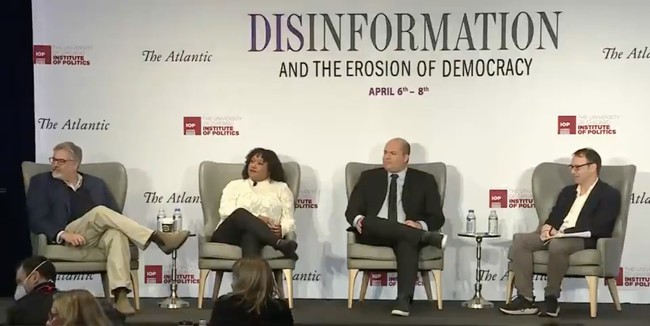From PJMedia.com

Eight years ago, when Donald Trump won his first term, the left and elites were aghast. “How could this happen?” they wailed.
The conventional wisdom at the time was that disinformation on social media and “Russian bots” were to blame. Evidently, the people were hypnotized into voting for Donald Trump. What other explanation could there possibly be?
Advertisement
In 2024, “there’s no big mystery, like, wow, why did this happen?” said Kelly McBride, a media ethics researcher at the Poynter Institute. “Nobody was tricked into voting for Donald Trump.”
Indeed, no one was “tricked” into voting for Trump in 2016, but admitting that would blow up several narratives — none of them very flattering — about the American people and how they choose their presidents.
Apparently, the only reason Donald Trump won in 2016 was the American voter was too stupid to see through the heavy-handed propagandizing by Russia and couldn’t differentiate fact from internet rumor.
But the disinformation clique plowed ahead. Tens of millions of dollars were poured into “disinformation labs.” A whole new industry sprang up to deal with the “crisis.” People weren’t voting the way they were told to vote so obviously, they were being tricked into voting “the wrong way.”
There’s a “crisis in the field of misinformation studies,” claimed an October article in Harvard University’s “Misinformation Review.”
“For almost a decade,” misinformation has been a central fixation of political elites, non-profits and the media, the authors wrote. Despite this, “it can sometimes feel as if the field is no closer to answering basic questions about misinformation’s real-world impacts, such as its effects on elections or links to extremism and radicalization.”
Foundational issues such as how to define misinformation are still vexing the field, the authors note. (Author emphasis)
Advertisement
How can you study misinformation if you can’t even define what it is? Sheesh.
Unable to define misinformation, they simply asked us to trust them when they told us what wasn’t “true.” It worked out about as well as you’d expect.
Politico notes whether “’Facebook significantly shaped the results of 2016 elections’ — which, eight years on, is still inconclusive, although studies have cast doubt on Russian bot farms having had much to do with it.” Recall that Democrats are still blaming Russia for Hillary Clinton’s 2016 loss. If they let go of that narrative, their impeachment of Donald Trump collapses into exactly what it was: a partisan witch hunt.
Some disinformation “experts” are slowly realizing that their idea of “disinformation” does not take into account that others might disagree with their interpretation of the facts.
“I think people within the field have come to realize that information and how it shapes our views of the world is certainly an important thing to understand,” said Felix Simon, communication researcher and research fellow in AI and Digital News at the Reuters Institute for the Study of Journalism.
“But it’s not the only factor, and in many cases not even the most important factor, driving political decisions, even including those that we personally might find problematic.”
Mr. Simon is shocked that people think critically in different ways, using different criteria to judge a candidate’s fitness for office even if that candidate is so obviously unqualified and evil. At least, to the elites.
Advertisement
At its zeitgeisty zenith, the field’s assumptions could be distilled as follows: Bad actors are circulating incorrect information online, people are unwittingly absorbing it, and their beliefs and behaviors are changing for the worse.
The antidote was to correct the falsehoods, first and foremost through exerting pressure on social media platforms to remove or otherwise flag or de-prioritize the offending content.
The problem was new because social media was new and was exerting novel influences on how people behaved. It was a pervasive problem that held significance for society at large.
The prevailing view among journalists and scholars was that it was a “bottom-up” problem: Nefarious actors, possibly funded by hostile foreign states, were polluting the bedrock of public discourse, contaminating the rest of the ecosystem.
“It’s not always the case that people believe and do bad things because they were exposed to bad information about it,” said Matthew Baum, professor of global communications at Harvard University. “People often bring attitudes and opinions to the table and then seek out information that is consistent with them.”
In fact, the most recent research shows that only “a small swath of highly invested, conspiratorially-inclined people” are susceptible to misinformation. And this small group of people are already inclined to believe nonsense.
As many of us have been saying all along, most people are smart enough to filter out the propaganda, leaving them with the essence of truth. They certainly didn’t need a bunch of academics lecturing them on what was truth and what was not.
Advertisement
A growing number of scholars believe that because objectivity is impossible to achieve in studying disinformation, it’s not a fit subject for scientific inquiry.
“Although misleading information is widespread and harmful, there can’t be — more precisely, there shouldn’t be — a science of misleading content,” wrote Dan Williams, an assistant professor in philosophy at the University of Sussex.
“And it is extremely misguided to delegate the task of determining which true claims are nevertheless misleading to a class of misinformation experts,” Williams wrote.
Writers, pundits, and internet commenters on the right were unfairly and probably deliberately smeared over the last decade by these high priests of “misinformation” and “disinformation.” I reject the argument that they “meant well” and were only trying to “save democracy.”
If they actually believed that, they’re more dangerous than any right-wing or left-wing nut spreading conspiracy theories on the internet.
All articles possibly rephrased by AI or InfoArmed.com